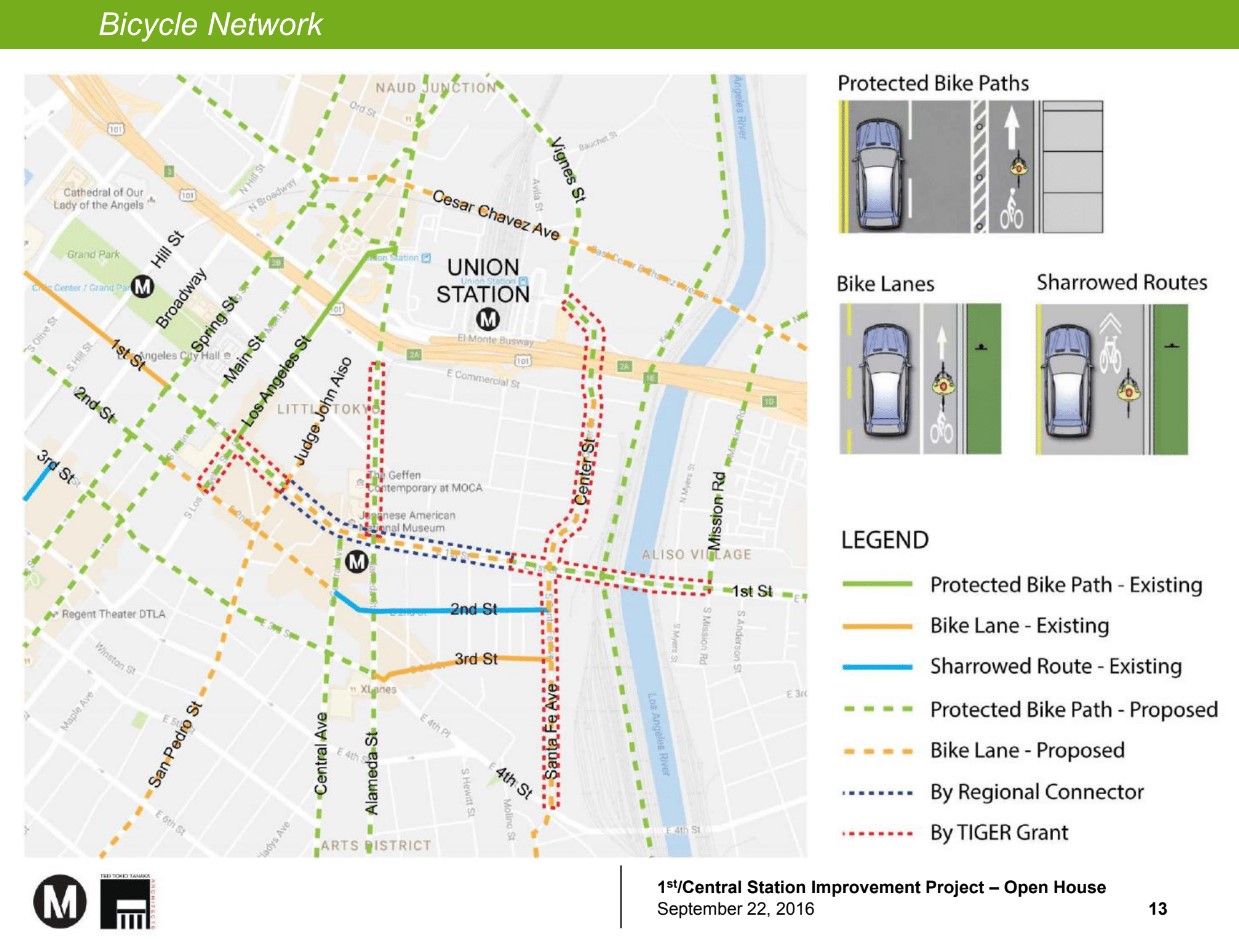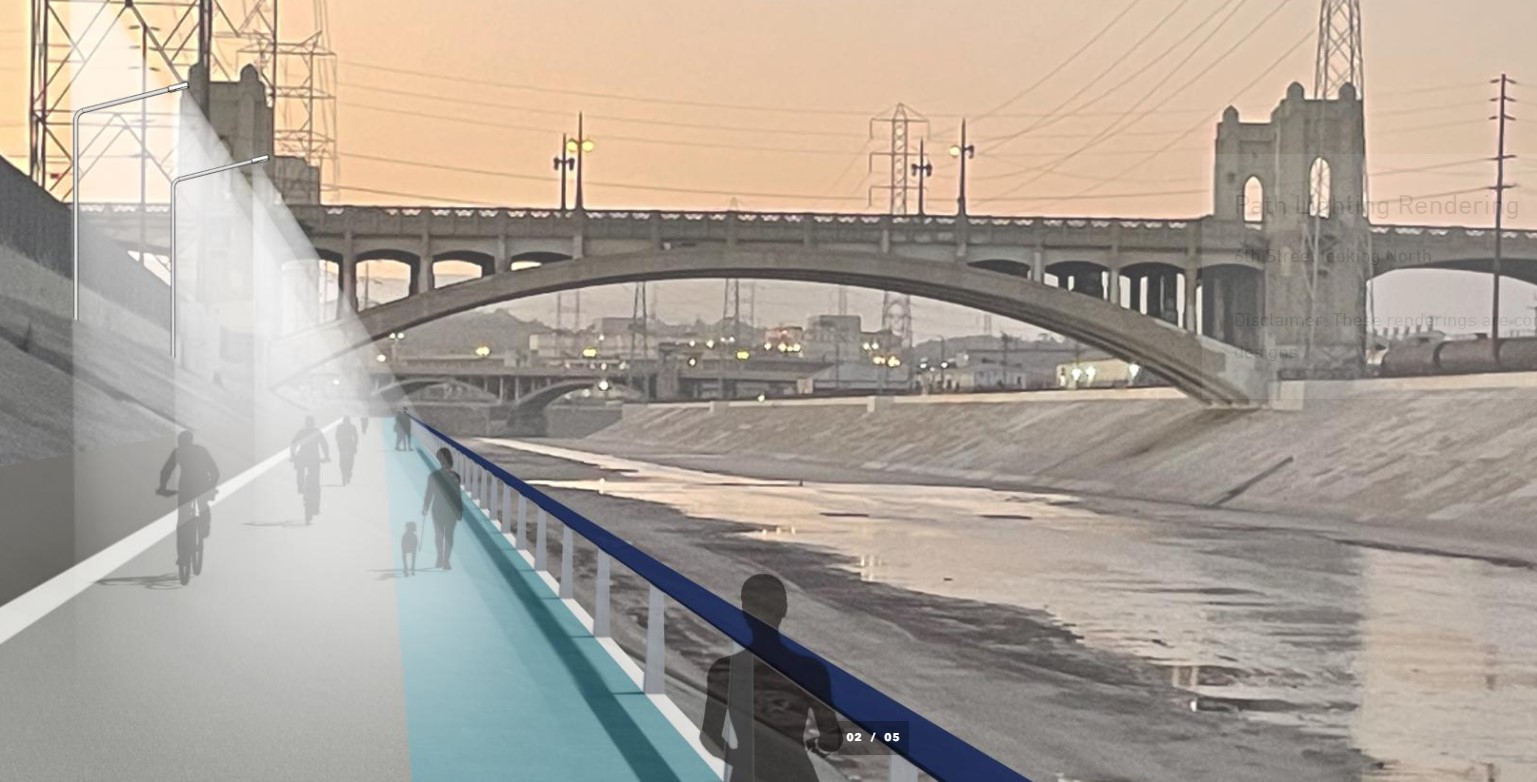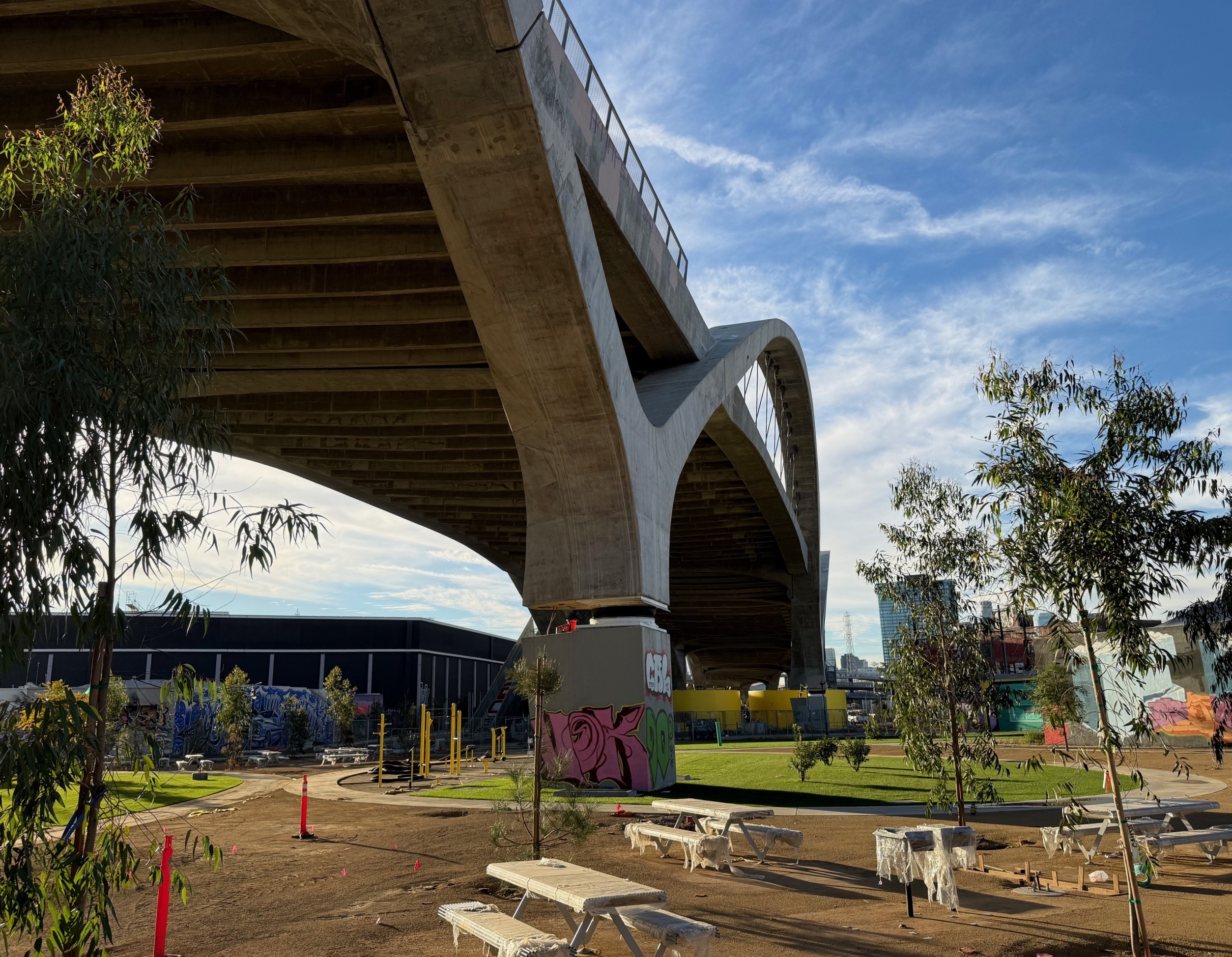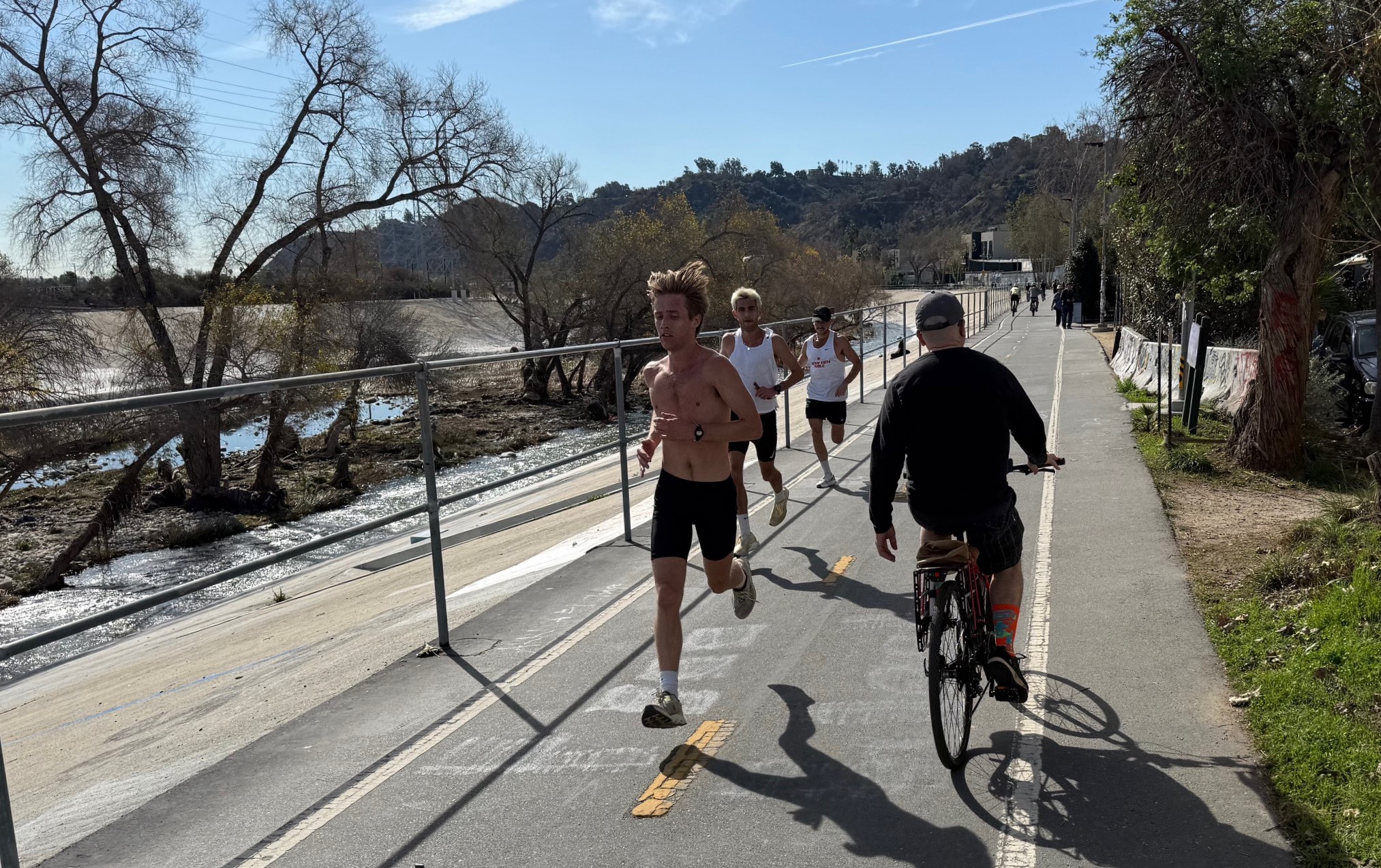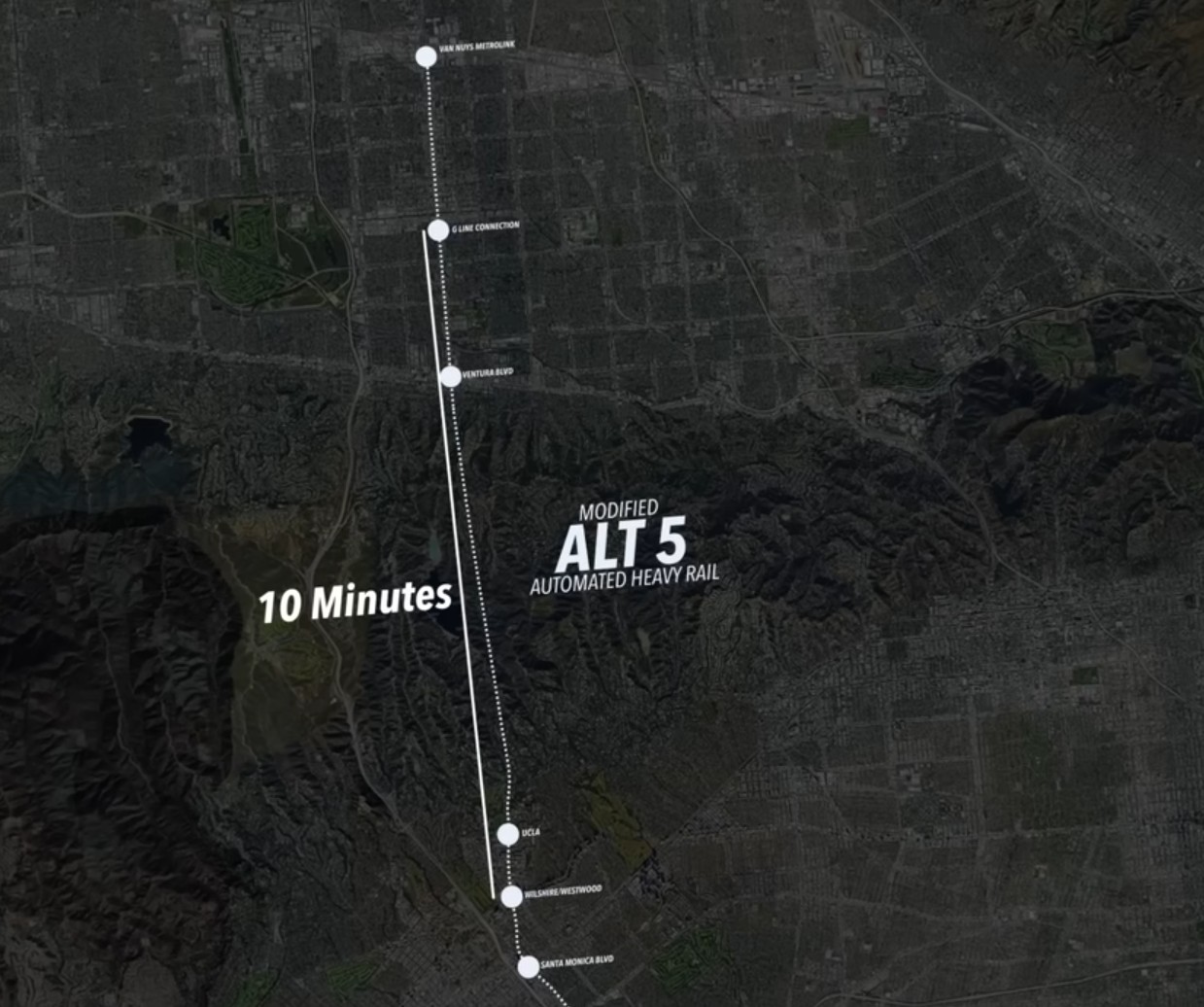Right after Metro Regional Connector subway stations opened last month, Streetsblog reported that Metro and L.A. City's Department of Transportation (LADOT) had omitted approved bikeway connections at Metro's new Broadway and Grand Stations, ignoring the city's approved street specifications and adding unplanned car capacity in place of approved bikeways.
It turns out that was the tip of the iceberg. Metro and LADOT also gave short shrift to extensive bike and walk upgrades approved and funded for first/last mile linkages to the new Little Tokyo Regional Connector station.
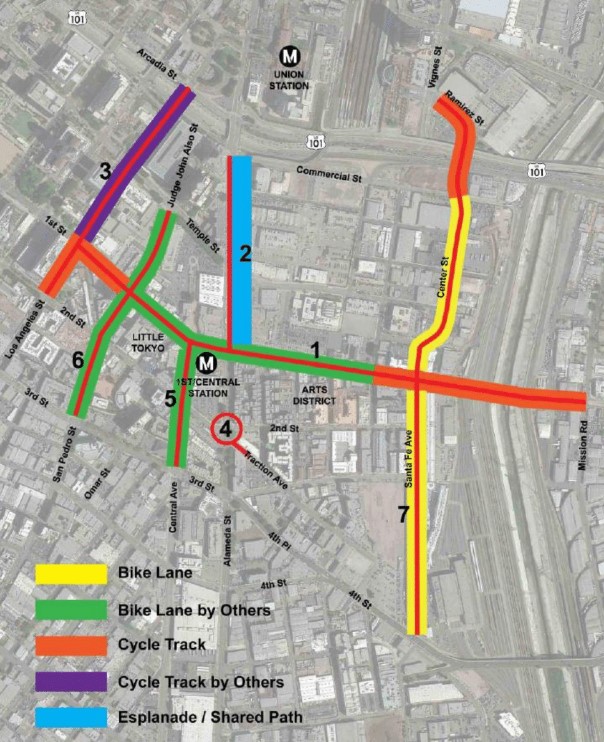
In 2014 Metro received an $11.8 million federal TIGER (Transportation Investment Generating Economic Recovery) grant for Little Tokyo Station bike/walk connections. That was combined with Measure R monies to become the $29.7 million Eastside Access Improvements project. Funding was to build a network of bike lanes, a pedestrian plaza, sidewalk bioswales, and more.
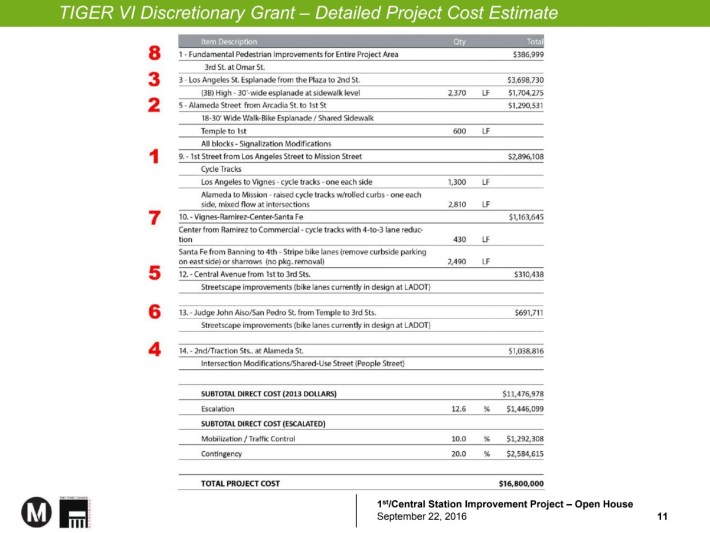
When Metro broke ground on the Little Tokyo improvements in 2021, Metro CEO Stephanie Wiggins praised the project as Metro "keeping promises to the community," emphasizing that Metro Regional Connector construction would "not only physically restore Little Tokyo to what it was before construction, but to make it better.”
Apparently those promises didn't apply to people on bike and on foot.
Grant in hand, Metro proceeded to scale back promised walk and bike facilities:
- 0.8 mile of new both-way protected bike lanes (1.6 lane-miles) became 0.6 mile of one-way protected bike lane westbound only - a 60 percent cut
- 1.8 new miles of unprotected lanes became 1.2 miles - a 33 percent cut.
- A two block (1,500-foot) Alameda Esplanade bike path was trimmed to one (500-foot) block - a 66 percent cut.
- One mile of bioswales was shortened to one-tenth of a mile (along the under-construction esplanade) - a 90 percent cut
- A People St plaza (on Traction Avenue between Alameda and Rose Streets) was omitted from the project.
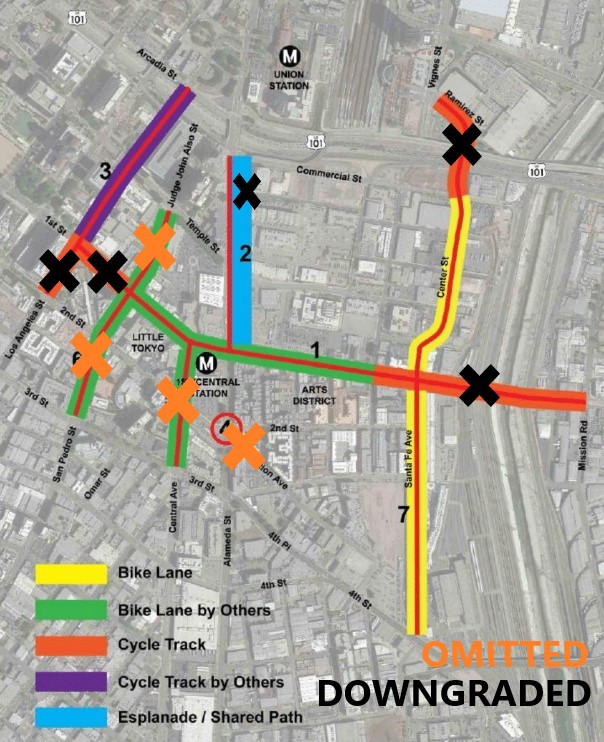
“It’s egregious that Metro and LADOT applied for federal money to do bikeway improvements in the most bikeable part of L.A. and then dramatically scaled back the improvements after winning the money,” wrote Michael Schneider, the founder of Streets For All.
In 2021, Streets for All and other bike advocates (including this article's author Joe Linton) urged Metro and L.A. City to take advantage of Regional Connector construction to build back better. At the time, City Council District 14 staff responded that some bike facilities were included with Connector street reconstruction (apparently the half-bikeway on Second Street, and scaled back unprotected lanes on First Street) and that no additional changes could be made at that time.
For Little Tokyo Regional Connector bikeways, it looks like both LADOT and Metro dropped the ball.
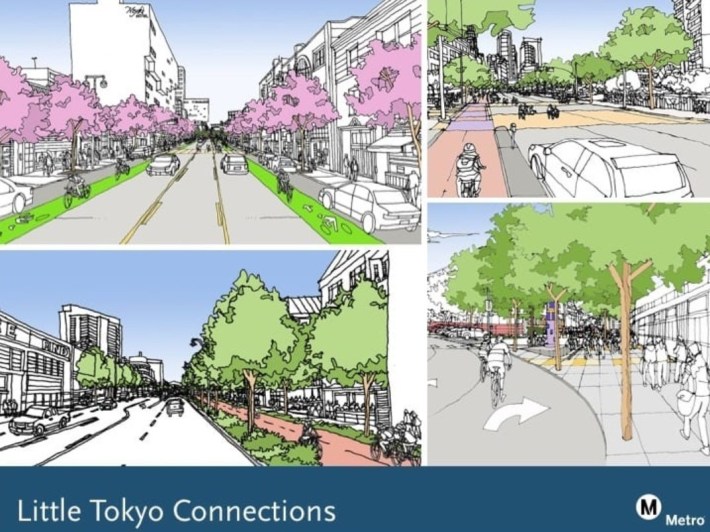
Some Metro bikeway deliverables were dropped/downgraded:
- Protected bike lanes were downgraded to unprotected on Ramirez Street, (part of) Center Street, Los Angeles Street, and eastbound First Street. (The TIGER grant states that the First street lanes would be "raised cycletracks" from Alameda to Mission.)
- Existing bike lanes on First Street (from Los Angeles Street to Judge John Aiso Street/San Pedro Street) were supposed to be upgraded to protected
Some LADOT bikeway deliverables were dropped:
- New unprotected bike lanes on Central Avenue from 1st Street to 3rd Street
- New unprotected bike lanes on Aiso/San Pedro from Temple Street to 3rd Street
It's not uncommon for costs or other factors to mean some trimming of projects. If Metro had cut five, ten, fifteen percent off of its TIGER deliverables, it would be justifiable. But Metro and DOT deeply slashed TIGER bikeways while Metro Regional Connector construction was widening streets and adding car capacity - in excess of L.A. City specifications. Metro and LADOT seem to misguidedly put more faith (more resources - widening streets is not cheap, and bike lanes are) into getting people to drive and park at downtown stations, compared to following through on supporting people bicycling and walking there.
Four days ago, Streetsblog inquired to both LADOT and Metro as to why the Regional Connector bike/walk facilities were omitted and downgraded, and whether the agencies are working to complete any further bikeways as part of current construction. LADOT did not respond. Metro responded with very little information, mainly noting that the Alameda Esplanade is under construction and expected to be complete in August.
There is a pattern of Metro dropping promised bikeways from projects. Metro's Rosa Parks Station revamp (another federal TIGER grant) omitted a protected cycletrack shown in plans up to and during construction. Metro also omitted planned bikeways on: 57/60 Freeway expansion, 605 Freeway 'hot spot' projects at Beverly Boulevard and Valley Boulevard, Rosecrans Marquardt grade separation, Expo Line, and more.
L.A. City also frequently omits approved bikeways from street work (including resurfacing - leading to Streets For All's efforts to pass the Healthy Streets L.A. initiative). Some recent omissions (on city Bureau of Engineering-led projects) include the Riverside Drive Bridge, Spring Street Bridge project (bridge lanes added four years late, but still missing on Wilhardt Street), and the Sixth Street Viaduct (bike lanes dropped on east approach).
“It’s high time that our public agencies start treating bike lanes as real transportation infrastructure, instead of an afterthought that must not inconvenience drivers," Schneider stated. "They should implement the omitted elements now to avoid having to give the Feds their money back.”
Metro is still closing out construction on the Regional Connector and Eastside Access Improvements. The missing bikeways could probably be added somewhat quickly as relatively inexpensive change orders (meaning changing the construction specifications to match what L.A. City and Metro had approved in 2008 and 2014). Metro is unlikely to correct Regional Connector (fairly expensive) concrete curb work, but via re-striping (fairly cheap), could add back the missing bike lanes, also adding basic plastic bollard protection. These inexpensive measures would support Metro system ridership, the environment, public health, and the ailing climate.
Had Metro opened the Regional Connector with the actual bikeways already planned/approved/funded, it could have been transformative. There would have been great bike and walk connections to the wonderful new rail stations. Instead of prioritizing cyclists and pedestrians, the new stations are surrounded by widened streets with more lanes and more space for driving. Pedestrians face widened crossings, missing crosswalks, and an omitted street closure plaza. Where an interconnected bikeway network was promised, limited meager half-measures were delivered.
Will Metro and LADOT act urgently to fix these Connector station first/last mile shortcomings? Time will tell.
